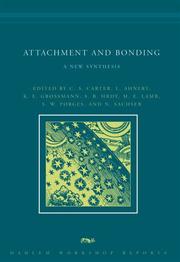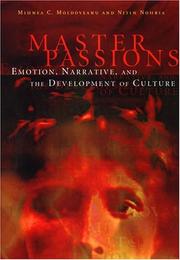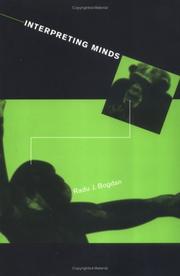| Listing 1 - 10 of 121 | << page >> |
Sort by
|
Book
ISBN: 0262377284 0262377292 0262547104 Year: 2024 Publisher: Cambridge, Massachusetts : The MIT Press,
Abstract | Keywords | Export | Availability | Bookmark
 Loading...
Loading...Choose an application
- Reference Manager
- EndNote
- RefWorks (Direct export to RefWorks)
"The Elephant and the Blind is a book about why we need a new culture of consciousness, and how to get it. A culture of consciousness (or Bewusstseinskultur) is a culture that values and cultivates the mental states of its members in an ethical and evidence-based way"--

ISBN: 0262033488 0262528541 9786612097973 0262269961 1282097970 1423769872 9780262269964 9781423769873 9780262033480 9781282097971 6612097973 Year: 2005 Volume: *18 Publisher: Cambridge (Mass.) MIT Press
Abstract | Keywords | Export | Availability | Bookmark
 Loading...
Loading...Choose an application
- Reference Manager
- EndNote
- RefWorks (Direct export to RefWorks)
"In this Dahlem workshop report, scientists from different disciplines-including anthropology, psychology, psychiatry, and behavioral biology-come together to explore the concepts of attachment and bonding from diverse perspectives. In their studies they seek to understand the causes or the consequences of attachment and bonding in general and their different qualities in individual development in particular. They address such questions as biobehavioral processes in attachment and bonding; early social attachment and its influences on later patterns of behavior; bonding later in life; and adaptive and maladaptive (or pathological) outcomes."--Publisher's description.

ISBN: 0262280086 058544255X 0262263769 9780585442556 9780262280082 9780262134057 Year: 2002 Publisher: Cambridge, Mass. MIT Press
Abstract | Keywords | Export | Availability | Bookmark
 Loading...
Loading...Choose an application
- Reference Manager
- EndNote
- RefWorks (Direct export to RefWorks)
An exploration of the powerful role of anxiety, ambition, and envy in shaping both our individual lives and society as a whole. At the heart of the human experience lies anxiety caused by the realization that the world is unknown, forever eluding our control. And out of this anxiety arises the master passions of ambition and envy, which we repress to mask their power over our lives. Discussion of the role of the emotions in our lives is not new, but Mihnea Moldoveanu and Nitin Nohria go much further, showing how these passions shape not only our individual lives but our social and organizational culture as well. The master passions are not pretty, and so we cover them with the more socially acceptable faces of reason and morality. Moldoveanu and Nohria guide the reader in revealing the real impetus behind such actions as firing a friend, leaving a lover, or even pillaging your own people. Below the rational explanation, they show, often lies a willingness to hurt or even destroy others to fuel our own ambitions or quench the fires of envy. The authors offer intriguing thought experiments and examples from their own lives as they expose the power of the master passions. Deftly weaving ideas from psychology (Sigmund Freud), sociology (Max Weber), literature (William Shakespeare, Albert Camus), and philosophy (David Hume, Adam Smith, Karl Marx, Friedrich Nietzsche) with the personal, they build a strong argument that society would be much healthier if we faced the deception and self-deception that pervade our lives.
Emotions --- Ambition. --- Envy. --- Social aspects. --- Aspiration (Virtue) --- Deadly sins --- Jealousy --- Virtues --- COGNITIVE SCIENCES/Psychology/Cognitive Psychology --- PHILOSOPHY/General
Book
ISBN: 0262375370 0262375362 0262546191 Year: 2023 Publisher: Cambridge, Massachusetts : The MIT Press,
Abstract | Keywords | Export | Availability | Bookmark
 Loading...
Loading...Choose an application
- Reference Manager
- EndNote
- RefWorks (Direct export to RefWorks)
"An argument against dual process theories and unconscious thought to explain the human mind and behavior" --

ISBN: 0262025140 0262523221 0262268027 0585436878 9780262025140 9780262523226 Year: 2002 Publisher: Cambridge, Mass. : MIT Press,
Abstract | Keywords | Export | Availability | Bookmark
 Loading...
Loading...Choose an application
- Reference Manager
- EndNote
- RefWorks (Direct export to RefWorks)
The fifty-seven original essays in this book provide a comprehensive overview of the interdisciplinary field of animal cognition. The contributors include cognitive ethologists, behavioral ecologists, experimental and developmental psychologists, behaviorists, philosophers, neuroscientists, computer scientists and modelers, field biologists, and others. The diversity of approaches is both philosophical and methodological, with contributors demonstrating various degrees of acceptance or disdain for such terms as "consciousness" and varying degrees of concern for laboratory experimentation versus naturalistic research. In addition to primates, particularly the nonhuman great apes, the animals discussed include antelopes, bees, dogs, dolphins, earthworms, fish, hyenas, parrots, prairie dogs, rats, ravens, sea lions, snakes, spiders, and squirrels. The topics include (but are not limited to) definitions of cognition, the role of anecdotes in the study of animal cognition, anthropomorphism, attention, perception, learning, memory, thinking, consciousness, intentionality, communication, planning, play, aggression, dominance, predation, recognition, assessment of self and others, social knowledge, empathy, conflict resolution, reproduction, parent-young interactions and caregiving, ecology, evolution, kin selection, and neuroethology.
Book
ISBN: 1282694197 9786612694196 0262255197 0262309025 9780262255196 9781282694194 9780262012843 9780262512428 0262012847 0262512424 Year: 2009 Publisher: Cambridge, Mass. MIT Press
Abstract | Keywords | Export | Availability | Bookmark
 Loading...
Loading...Choose an application
- Reference Manager
- EndNote
- RefWorks (Direct export to RefWorks)
A collection of cutting-edge work on cognition and a celebration of a foundational figure in the field.
Cognition. --- Cognitive science. --- Pylyshyn, Zenon W., --- Science --- Philosophy of mind --- Psychology --- COGNITIVE SCIENCES/General --- COGNITIVE SCIENCES/Psychology/Cognitive Psychology --- Cognitive psychology --- Cognition --- Cognitive science

ISBN: 0262268892 0585330107 9780262268899 9780262024198 9780585330105 0262024195 Year: 1997 Publisher: Cambridge, Mass. MIT Press
Abstract | Keywords | Export | Availability | Bookmark
 Loading...
Loading...Choose an application
- Reference Manager
- EndNote
- RefWorks (Direct export to RefWorks)
Unlike most current researchers in philosophy and psychology, who view interpretation as a way to understand the minds and behavior of others, Radu J. Bogdan sets out to establish a new evolutionary and practical view of interpretation. According to Bogdan, the ability to interpret others' mental states has evolved under communal, political, and epistemic pressures to enable us to cope with the impact of other organisms on our own goals in the competition to survive. Interpretation evolved among primates by natural and then cultural selection. As an adaptation, it is a competence in the form of a battery of practical skills that serve the interpreter's interests in social interactions. Evolutionary theory does not just deepen our understanding of interpretation; without it, we cannot understand what interpretation is and how it does its job. Interpreting Minds raises many thought-provoking issues for philosophers of mind and culture; evolutionary, developmental, and social psychologists; ethologists; cognitive and cultural anthropologists; evolutionary biologists; and others interested in cognitive development.
Philosophy. --- Psychology. --- Philosophy --- Psychology --- Philosophy & Religion --- Mental philosophy --- Behavioral sciences --- Mind --- Science, Mental --- Humanities --- Human biology --- Soul --- Mental health --- PHILOSOPHY/General --- COGNITIVE SCIENCES/Psychology/Cognitive Psychology
Book
ISBN: 0262320673 0262028107 1322519668 9780262320672 9780262028103 0262321157 9780262321150 0262320681 0262027569 1322094705 0262321165 0262528835 Year: 2014 Publisher: Cambridge, Mass. The MIT Press
Abstract | Keywords | Export | Availability | Bookmark
 Loading...
Loading...Choose an application
- Reference Manager
- EndNote
- RefWorks (Direct export to RefWorks)
"The computer analogy of the mind has been as widely adopted in contemporary cognitive neuroscience as was the analogy of the brain as a collection of organs in phrenology. Just as the phrenologist would insist that each organ must have its particular function, so contemporary cognitive neuroscience is committed to the notion that each brain region must have its fundamental computation. In After Phrenology, Michael Anderson argues that to achieve a fully post-phrenological science of the brain, we need to reassess this commitment and devise an alternate, neuroscientifically grounded taxonomy of mental function. Anderson contends that the cognitive roles played by each region of the brain are highly various, reflecting different neural partnerships established under different circumstances. He proposes quantifying the functional properties of neural assemblies in terms of their dispositional tendencies rather than their computational or information-processing operations. Exploring larger-scale issues, and drawing on evidence from embodied cognition, Anderson develops a picture of thinking rooted in the exploitation and extension of our early-evolving capacity for iterated interaction with the world. He argues that the multidimensional approach to the brain he describes offers a much better fit for these findings, and a more promising road toward a unified science of minded organisms"--MIT CogNet.
Brain --- Physiology. --- COGNITIVE SCIENCES/General --- COGNITIVE SCIENCES/Psychology/Cognitive Psychology --- NEUROSCIENCE/General --- Neuropsychology --- Methods --- Cognition --- Cognitive psychology --- Physiology of nerves and sense organs --- Physiology
Book
ISBN: 0262329824 0262329832 0262029782 9780262329828 9780262029780 9780262329835 Year: 2015 Publisher: Cambridge, Mass. The MIT Press
Abstract | Keywords | Export | Availability | Bookmark
 Loading...
Loading...Choose an application
- Reference Manager
- EndNote
- RefWorks (Direct export to RefWorks)
A novel, wide-ranging, and comprehensive account of how human emotionality develops, proposing a process in which "nature" and "nurture" are integrated.
Emotions. --- Feelings --- Human emotions --- Passions --- Psychology --- Affect (Psychology) --- Affective neuroscience --- Apathy --- Pathognomy --- PHILOSOPHY/General --- COGNITIVE SCIENCES/Psychology/Cognitive Psychology --- Metaphysics --- Philosophical anthropology --- Theory of knowledge
Book
ISBN: 0262279495 1417560673 9780262279499 9781417560677 Year: 2004 Publisher: Cambridge, Mass. MIT Press
Abstract | Keywords | Export | Availability | Bookmark
 Loading...
Loading...Choose an application
- Reference Manager
- EndNote
- RefWorks (Direct export to RefWorks)
Early Reading Instruction is a comprehensive analysis of the research evidence from early writing systems to computer models of reading. In this book, Diane McGuinness provides an innovative solution to the "reading war"--the century-old debate over the efficacy of phonics (sound-based) versus whole-word (meaning- based) methods. She has developed a prototype--a set of elements that are critical to the success of a reading method.McGuinness shows that all writing systems, without exception, are based on a sound unit in the language. This fact, and other findings by paleographers, provides a platform for the prototype. Other elements of the prototype are based on modern research. For example, observational studies in the classroom show that time spent on three activities strongly predicts reading success: learning phoneme/symbol correspondences, practice at blending and segmenting phonemes in words, and copying/writing words, phrases, and sentences. Most so-called literacy activities have no effect, and some, like sight word memorization, have a strongly negative effect.The National Reading Panel (2000) summarized the research on reading methods after screening out thousands of studies that failed to meet minimum scientific standards. In an in-depth analysis of this evidence, McGuinness shows that the most successful methods (children reading a year or more above age norms) include all the elements in the prototype. Finally, she argues, because phonics-type methods are consistently shown to be superior to whole-word methods in studies dating back to the 1960s, it makes no sense to continue this line of research. The most urgent question for future research is how to get the most effective phonics programs into the classroom.
| Listing 1 - 10 of 121 | << page >> |
Sort by
|

 Search
Search Feedback
Feedback About UniCat
About UniCat  Help
Help News
News